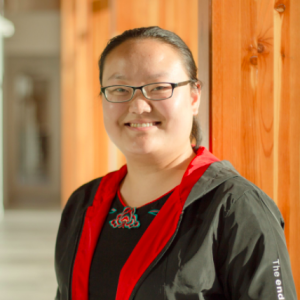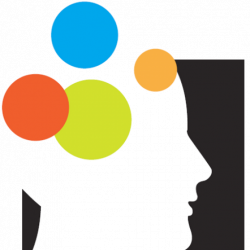By: Maheep Chawla, Lauryn Murray

Major: Psychology
Year: 4
Home: Originally from China but I moved to Vancouver to study when I was 18/19
Preferred pronouns: She/her/hers
Fun fact: All my life, I thought of myself as a dog person but my mother got a cat (who is named after me) 2 years ago
and now I love cats!
Could you give us a short overview of your directed studied project? Starting off with your research topic?
I worked on 2 Directed Studies projects. My first Directed Studies project looked at the relationship between testosterone and social dominance. We looked at how the testosterone level of males would impact other peoples’ perceptions of them. The interesting part of that research is that we asked our participants to rate social dominance in males by smelling their shirts. We tested the testosterone levels of our male volunteers by collecting their saliva and sending it to an external organisation to measure their hormonal levels. After that, we asked the males to wear a shirt for a week straight before we gave them to our participant pool to smell, after which we asked them to rate how dominant they think the person wearing the shirt is. Our hypothesis was that testosterone levels and the participants’ ratings for social dominance are directly proportional to one another.
The second research project was a pilot study of a larger study. We were trying to figure out whether music could be used as a cultural priming tool to elicit cultural connectedness in our bicultural participant pool. In simple terms, we wanted to see if Chinese songs could make our participants feel more connected to Chinese culture, and if English songs could make our participants feel more connected to the North American culture. It was a within-subjects experimental design and our hypothesis was that participants would feel more connected to one culture when listening to music with that culture.
Participants completed an online survey in which they were asked to complete a series of demographics questions and surveys measuring trait level variables such as personality, trait identification with heritage culture and mainstream culture. The participants were then assigned to listen to and rate 16 30-second music clips. To enhance the validity of our procedure, music clips were matched to their year of immigration (e.g., a student who immigrated to Canada in 2008 will listen to 8 Chinese music clips from the years 2006 and 2007; 8 North American music clips from the years 2009 and 2010). While listening to each clip, the participant was instructed to do freewriting about their current feelings. After listening to each clip, they were asked to self-report on state-level variables (state authenticity, culture identification with heritage culture and North American culture).
What sparked your interest in your research topic and how did you build your hypothesis?
I was only a part of the 2nd research project from start to finish so I’ll talk about that. I took Cultural Psychology with Dr. Benjamin Cheung which I enjoyed. I was really interested in how our culture identities and cultural connectedness would impact our daily behavior, our thoughts, and our feelings.
Was there anyone who inspired you to look into this topic?
I had many mentors whom I am really appreciative towards. Someone who inspired me to go into research in Social Psychology is Dr. Simon Lolliot. He was teaching me two intro level psychology courses which introduced me to the world of Psychology. Another mentor who really inspired me is Audrey. She is a graduate student with the social identity lab. She was always excited to hear my ideas and she helped me get a research grant for Summer 2020.
What was your favourite part of the process?
My experience with the two projects were quite different because I only handled the last stage in the first project. I learned a lot of statistical analysis techniques throughout the process, like R coding. I’m not a stats person, so it was interesting! For the music study, starting from the beginning to answering questions and altering the design – I enjoyed this one the most because I got to put a lot of input into the study design.
Is there anything you can share with us about the results that you found? What trends/conclusions did you observe?
In the first study, our hypothesis was sort of confirmed, but we didn’t get a large enough sample size, so it wasn’t statistically significant. However the trends we wanted were there: higher testosterone correlated with higher dominance ratings. In the second study, we confirmed our hypothesis with a larger sample and it was statistically significant. The conclusion is our first-generation Chinese immigrant participants feel more connected to Chinese culture when they listen to Chinese songs while feeling more connected to North American culture when they listen to English songs
What was the most surprising observation from your study?
The most surprising result was in the second study — while we were expecting Chinese immigrants to feel more authentic when they listened to Chinese songs, we did not expect the other result, which was among those who did not feel connected to Chinese culture. They actually felt more authentic when listening to English songs despite being of Chinese descent. This is the negative impact of disconnecting from Chinese culture that would be buffered by connecting with North American culture.
What will you be doing with your data and conclusion now? How do you plan on presenting it?
I was going to do a poster presentation of our first study last year at PURC, but the event was cancelled. It was published in the UBC archive library for undergraduate research. The second study is planned to be presented as an oral presentation at this year’s PURC.
How do you see the results of your study being applied in the real world?
For the testosterone and dominance study, I think its real life application will be in helping us understand how we select friends and romantic partners. It also gives us insight into how smell plays a role in the choices we make. However, our study goes beyond just that. It looks at how smell and dominance intertwine to play a role in our decision making when it comes to finding companions. For the second study, I believe it has practical implications, because we know that connectedness to one culture is a pretty important factor in the concept of ‘fit’: if you feel connected to one culture, it’s natural that you will feel you are fitting in well within said cultural group. It is an important concept for us to know, especially at UBC, a diverse campus with international students from varying cultures. This potentially opens doors for future studies.
If you could do your study again, what would you do differently and why?
If I had a chance to join the first study in its earlier stages, I would conduct the data collection process in a more precise manner because when I was actually looking at the data, I found a lot of mistakes that we could have potentially avoided if we were to work carefully. Also, this was a five year long study so a lot of the data had been misplaced. We could have practiced better data collection storage in general. If I got to personally do something better, I would push for collecting more samples. In the end, we figured that if we were to get more participants, we could potentially be finding significant results.
How has your project helped you grow, both personally and professionally?
I think I’ve learned a lot on the personal level such as how to manage projects. This project taught me how to communicate with people more efficiently as I spent a lot of time working directly with participants. And professionally, I think this project helped me think more critically.
What course(s) do you think were most helpful in gaining background knowledge about your research topic?
Psyc 307 – Cultural Psychology. It was my first 300 level course. It felt like a biography about my life as a bicultural individual! This course inspired me to dive deeper into cultural research. I would also love to do more research related to this in the future.
Tell us about how you stay organised and manage your time while doing a research project. How do you prioritise? How do you motivate yourself?
I juggled between tons of stuff. I would do a few research projects, depending on what was going on that term: a full course load, part time job, and sometimes volunteer work for organizations. I used the system called ‘important and urgent’: ranking what needed to be prioritized. I followed that pyramid for school, readings, and deadlines. Google calendar helped me with my course schedule and work schedule. Generally, I tried to do the research related stuff in my free time. I had to give up lots of free time but it was worth it because I enjoyed the process. I also used a software called “Days Matters” which puts the deadline in and lets you know how much time is remaining.
What was the most challenging part about doing a directed studies project? What was most rewarding?
It is definitely writing codes, the statistical analysis was a real learning process for me because it requires going back and forth. I had to learn more stats for the project; organizing, tidying, making sure you aren’t missing anything. It involved complex multilevel modelling, it is important because it just can’t be organized with only correlation. But it’s also rewarding because stats became second nature to me.
How do you network within the psychology community, and where have you made your most valuable connections?
Definitely in the labs! I worked with several undergrad RAs and we would talk about research, our courses, and I became good friends with the team. Also, connecting with the grad students was a good networking platform. I was able to ask them questions about grad school. It was really helpful and they were super generous with guidance. I wasn’t successful this year with grad school applications, but I was able to ask the supervisor and grad students for advice so I can improve for future applications.
What are your other interests outside of Psychology? Are you a part of any clubs or teams?
I’m really passionate about international student experience. My part time job is working for UBC International Student Initiative. I was also a Jumpstart Orientation Leader, and I volunteered in one of UBC’s peer mentor programs- Vantage Peer Mentor program. I love providing support and advice for first year international students. I received a lot of great help from my mentors so I would like to give back to the community.
What are your professional goals and plans for the future? What do you see yourself doing in 10 years time?
I would definitely hope that I can get into grad school, and become a professor. I would love to do research and train students. That’s kind of my dream profession but I am also open to other possibilities.

